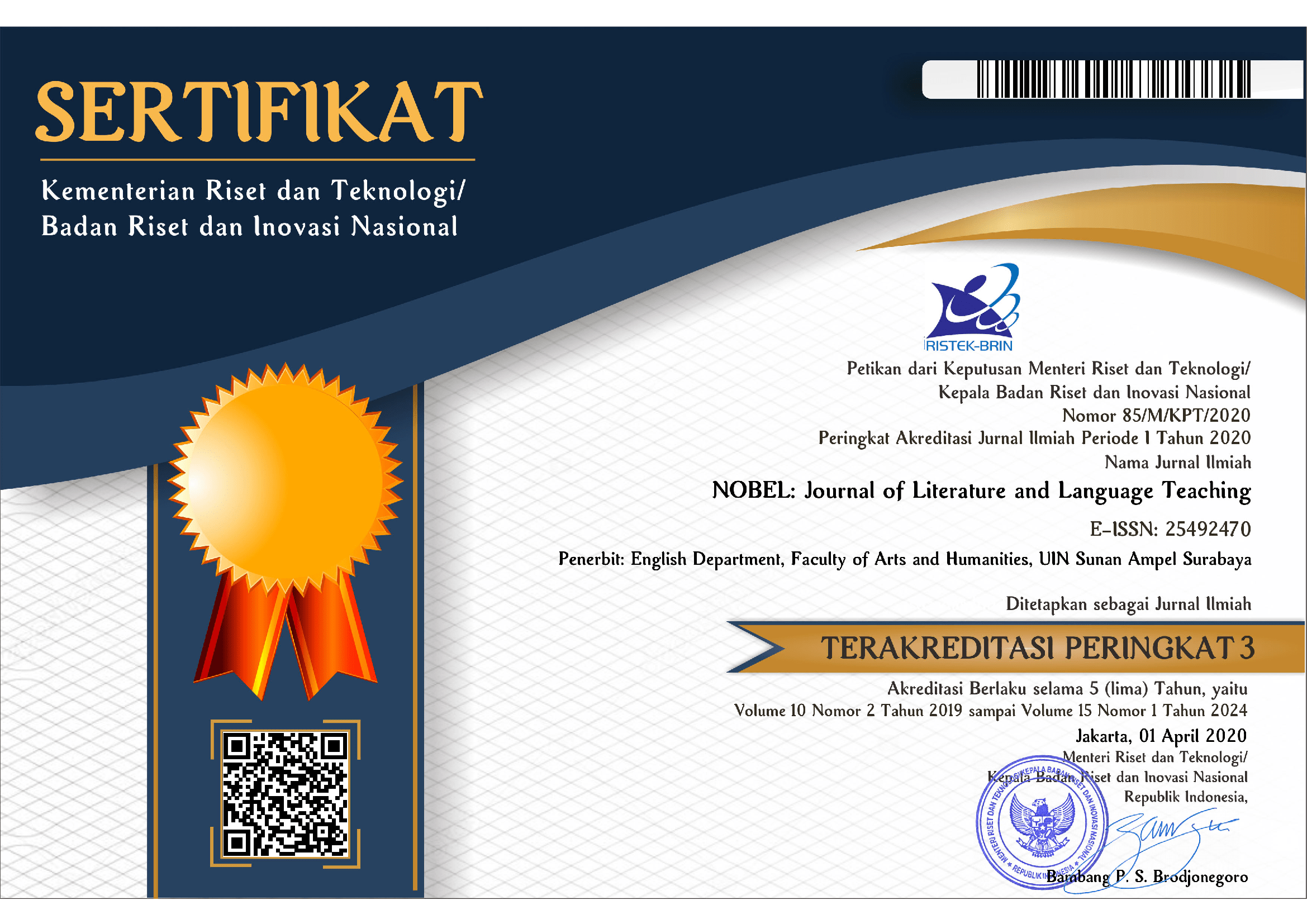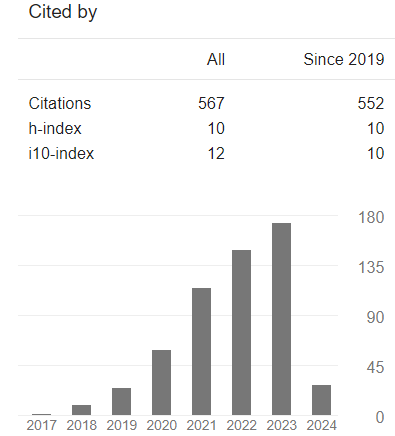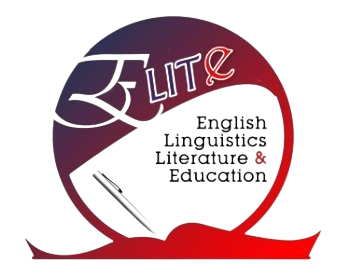Integrating Social Media into English Language Learning: How and to What Benefits According to Recent Studies
DOI:
https://doi.org/10.15642/NOBEL.2021.12.1.91-111Keywords:
21st-century skills; English Language Learning; information/ communication technology; social mediaAbstract
Social media has become an integral part of life, including in the field of education. This study aimed to explore social media as a teaching and learning tool, its use, and its benefit for students of English as Foreign Language. This study applied library research from George (2008), where the sources of the data were previous studies on the use of social media in the context of English as Foreign Language, published in reputable international journals or accredited national journal ranked SINTA 1, SINTA 2, and SINTA 3, between 2015 to 2020. The review revealed that YouTube, WhatsApp, Facebook, Instagram, and Twitter have been frequently applied as English learning media through various activities that matched the features provided by the respective social media. Their implementations in English learning have been argued to positively impact the students’ language skills, vocabulary, grammar, pronunciation, spelling, motivation, as well as their creative and critical thinking. These results reflect a positive attitude toward social media as an inseparable part of the students’ 21st – century learning contexts. However, more studies need to be conducted to optimize the use of social media for improving students’ English and their 21st-century skills.
Downloads
References
Abu-Shanab, E., & Al-Tarawneh, H. (2015). The influence of social networks on high school students’ performance. International Journal of Web-Based Learning and Teaching Technologies, 10(2), 49-59. DOI: 10.4018/IJWLTT.2015040104
Akayo?lu, S., Satar, H. M., Dikilita?, K., Cirit, N. C., & Korkmazgil, S. (2020). Digital literacy practices of Turkish pre-service EFL teachers. Australasian Journal of Educational Technology, 36(1), 85-97. DOI: 10.14742/ajet.4711
Al Arif, T. Z. (2019). The use of social media for English language learning: An exploratory study of EFL university students. Metathesis: Journal of English Language Literature and Teaching, 3(2), 224-233. DOI: 10.31002/metathesis.v3i2.1921
Alsaadat, K. (2018). The impact of social media technologies on adult learning. International Journal of Electrical and Computer Engineering (IJECE), 8(5), 3747~3755. DOI: 10.11591/ijece.v8i5.pp3747-3755
Alshabeb, A. M., & Almaqrn, R. K. (2018). A study of EFL Saudi students’ use of mobile social media applications for learning. Arab World English Journal (AWEJ), 2018(4), 214-226. DOI: 10.24093/awej/call4.17
Alshenqeeti, H. (2018). Technology in the language classroom: How Social media is changing the way EFL is taught. Arab World English Journal (AWEJ), 2018(4), 55-68. DOI: 10.24093/awej/call4.5
Alwehaibi, H. O. (2015). The impact of using YouTube in EFL classroom on enhancing EFL students’ content learning. Journal of College Teaching & Learning (TLC), 12(2), 121-126. DOI: 10.19030/tlc.v12i2.9182
Anggraeni, C. W. (2018). Promoting education 4.0 in English for survival class: What are the challenges? METATHESIS: Journal of English Language, Literature, and Teaching, 2(1), 12-24. DOI: 10.31002/metathesis.v2i1.676
Ansari, J. A., & Khan, N. A. (2020). Exploring the role of social media in collaborative learning the new domain of learning. Smart Learning Environments, 7(9), 1-16. DOI: 10.1186/s40561-020-00118-7
Aloraini, N. (2018). Investigating Instagram as an EFL learning tool. Arab World English Journal (AWEJ), 2018(4), 174-184. DOI: 10.24093/awej/call4.13
Arthana, I. K. R., Dantes, G. R., & Dantes, N. (2018). Optimalisasi pemanfaatan teknologi informasi dan komunikasi (TIK) dalam bidang pendidikan melalui penerapan smart school. Jurnal Widya Laksana, 7(1), 81–91. https://ejournal.undiksha.ac.id/index.php/JPKM/article/view/11885
Awada, G. (2016). Effect of WhatsApp on critique writing proficiency and perceptions toward learning. Cogent Education, 3(1), 1-25. DOI: 10.1080/2331186X.2016.1264173
Ayuningtyas, P. (2018). Whatsapp: Learning on the go. Metathesis: Journal of English Language Literature and Teaching, 2(2), 159-170. DOI: http://dx.doi.org/10.31002/metathesis.v2i2.629
Badri, M., AlNuaimi, A., Guang, Y., & Rashedi, A. A. (2017). School performance, social networking effects, and learning of school children: Evidence of reciprocal relationships in Abu Dhabi. Telematics and Informatics, 34(8), 1433-1444. DOI: 10.1016/j.tele.2017.06.006
Baruah, T. D. (2012). Effectiveness of social media as a tool of communication and its potential for technology enabled connections: A micro-level study. International Journal of Scientific and Research Publications, 2(5), 1-10. http://www.ijsrp.org/research_paper_may2012/ijsrp-may-2012-24.pdf
Beemt, A. V., Thurlings, M., & Willems, M. (2019). Towards an understanding of social media use in the classroom: a literature review. Technology, Pedagogy and Education, 29(1), 35-55. DOI: 10.1080/1475939X.2019.1695657
Boholano, H. B. (2017). Smart social networking: 21st century teaching and learning skills. Research in Pedagogy, 7(1), 21-29. DOI: 10.17810/2015.45
Camus, M., Hurt, N. E., Larson, L. R., & Prevost, L. (2016). Facebook as an online teaching Tool: Effects on student participation, learning, and overall course performance. College Teaching, 64(2), 84-94. DOI: 10.1080/87567555.2015.1099093
Çetinkaya, L., & Sütçü, S. S. (2018). The effects of Facebook and WhatsApp on success in English vocabulary instruction. Journal of Computer Assisted Learning, 34(5), 504-514. DOI: 10.1111/jcal.12255
Chawinga, W. D. (2017). Taking social media to a university classroom: Teaching and learning using Twitter and blogs. An International Journal of Educational Technology in Higher Education, 14(3), 1-19. DOI: 10.1186/s41239-017-0041-6
Chisenga, J., Kedemi, R., & Sam, J. (2014). The use of social media in agricultural research workflows in Ghana and Kenya. Agricultural Information Worldwide, 6(2013/2014), 48-57. https://ecommons.cornell.edu/handle/1813/58278
Damanik, E. S. (2019). Student attitude toward the use of WhatsApp in EFL class. Vision Journal, 15(2), 13-22. http://jurnaltarbiyah.uinsu.ac.id/index.php/vision/article/view/619
Dantes, G.R., Suarni, N. K., Suputra, P. H., Suwastini, N. K. A., & Jampel, I. N. (2017). Face-expression detection: Detection of facial expression for optimizing the role of the e-learning system. Regionalization and Harmonization in TVET (Proceedings of the 4th UPI international conference on technical and vocational education and training), 289–292. DOI: 10.1201/9781315166568-61
Dantes, Gede Rasben, Suarni, N. K., Dharsana, I. K., Dantes, N., Jayanta, I. N. L., Suwastini, N. K. A., & Putra, G. J. A. (2019). Evaluation of e-learning as a learning agent. International Journal of Innovation and Learning, 25(4), 451–464. DOI: 10.1504/IJIL.2019.099989
Diamandis, P. H., & Kotler, S. (2012). Abundance: The future is better than you think. New York: Free Press.
Elkaseh, A. M., Wong, K. W., & Fung, C. C. (2016). Perceived ease of use and perceived usefulness of social media for e-learning in Libyan higher education: A structural equation modeling analysis. International Journal of Information and Education Technology, 6(3), 192-199. DOI: 10.7763/IJIET.2016.V6.683
Eisenlauer, V. (2020). The EFL-YouTube remix: Empowering multimodal and computational literacies for EFL purposes. Journal of Visual Literacy, 39(3-4), 149-166. DOI: 10.1080/1051144X.2020.1826220
Espinosa, L. F. (2015). The Use of Facebook for educational purposes in EFL classrooms. Theory and Practice in Language Studies, 5(11), 2206-2211. DOI: 10.17507/tpls.0511.03
Eyo, M. (2016). Counseling implications of teachers’ digital competencies in the use of Social Networking Sites (SNSs) in the teaching-learning process in Calabar, Nigeria. Cogent Education, 3(1), 1-9. DOI: 10/1080/2331186X.2015.1128134
George, M. W. (2008). The elements of library research. New Jersey: Princeton University Press.
Ghouali, K., & Benmoussat, S. (2019). Investigating the effect of social media on EFL students’ written production: Case of third-year EFL students at Tlemcen University, Algeria. Arab World English Journal (AWEJ), 2019(May), 24-39. DOI: 10.24093/awej/Chief1.3
Gunantar, D. A., & Transinata, T. (2019). Writing caption on Instagram as media for student’s motivation and writing skill improvement. ETERNAL: English Teaching Journal, 10(1), 30-35. DOI: 10.26877/eternal.v10i1.3905
Klimova, B., & Pikhar, M. (2020). Cognitive and applied linguistics aspects of using social media: The impact of the use of Facebook on developing writing skills in learning English as a foreign language. European Journal of Investigation in Health, Psychology and Education, 10(1), 110-118. DOI: 10.3390/ejihpe10010010
Lau, W. W. (2018). Relationships between pre-service teachers’ social media usage in informal settings and technological pedagogical content knowledge. EURASIA Journal of Mathematics, Science and Technology Education, 14(12), 1-12. DOI: 10.29333/ejmste/94228
Listiani, N. K. M., Suwastini, N. K. A., Dantes, G. R., Adnyani, N. L. P. S., & Jayantini, I. G. A. S. R. (2021). YouTube as digital learning resources for teaching bilingual young learners. Proceedings of the 2nd International Conference on Technology and Educational Science (ICTES 2020), 540(Ictes 2020), 156–162. Atlantis Press. DOI: 10.2991/assehr.k.210407.230
Lundy, A. D., & Stephens, A. E. (2015). Beyond the literal: Teaching visual literacy in the 21st century classroom. Procedia - Social and Behavioral Sciences, 174(2015), 1057-1060. DOI: 10.1016/j.sbspro.2015.01.794
Ma’azi, H., & Janfeshan, K. (2018). The effect of Edmodo social learning network on Iranian EFL learners writing skill. Cogent Education, 5(1), 1-17. DOI: 10.1080/2331186X.2018.1536312
Majid, A. H., & Stapa, S. H. (2017). The use of scaffolding technique via Facebook in improving descriptive writing among ESL learners. 3L: The Southeast Asian Journal of English Language Studies, 23(4), 77-88. DOI: 10.17576/3L-2017-2304-07
Menzies, R., Petrie, K., & Zarb, M. (2017). A case study of Facebook use: outlining a multi-layer strategy for higher education. Education and Information Technologies, 22(1), 39-53. DOI: 10.1007/s10639-015-9436-y
Minalla, A. A. (2018). The effect of WhatsApp chat group in enhancing EFL learners’ verbal interaction outside classroom contexts. English Language Teaching, 11(3), 1-7. DOI: 10.5539/elt.v11n3p1
Özdemir, E. (2017). Promoting EFL learners’ intercultural communication effectiveness: a focus on Facebook. Computer Assisted Language Learning, 30(6), 510-528. DOI: 10.1080/09588221.2017.1325907
Pattanapichet, F., & Wichadee, S. (2015). Using space in social media to promote undergraduate students’ critical thinking skills. Turkish Online Journal of Distance Education-TOJDE, 4(4), 38-49. https://eric.ed.gov/?id=EJ1092868
Pérez-Sabater, C., & Montero-Fleta, B. (2015). ESP vocabulary and social networking:The case of Twitter. Iberica, 129-154. https://riunet.upv.es/handle/10251/63393?show=full
Prasetyawati, O. A., & Ardi, P. (2020). Integrating Instagram into EFL writing. Teaching English with Technology, 20(3), 40-62. https://eric.ed.gov/?id=EJ1264231
Puspawati, N. W., Suwastini, N. K., Hutapea, J. V., Dantes, G. R., & Adnyani, N. L. (2021). Consumption and production of short film: toward the conceptualization of multimodal language learning for developing 6Cs skills in the digital age. Journal of Physics: Conference Series, 1810(2020), 1-6. DOI: 10.1088/1742-6596/1810/1/012054
Rajab, H., & Al-Sadi. (2015). An empirical study of reading habits and interests of Saudi university EFL learners. International Journal of Linguistics, 7(2), 1-17. DOI: 10.5296/ijl.v7i2.7034
Ramdani, J. M., & Widodo, H. P. (2019). Student teachers’ engagement in Facebook-assisted peer assessment in an initial teacher education context: Speaking 2.0. Journal of Education for Teaching, 45(3), 348-352. DOI: 10.1080/09589236.2019.1599503
Rodliyah, R. S. (2016). Sing a Facebook closed group to Improve EFL students’ writing. TEFLIN Journal, 27(1), 82-100. DOI: 10.15639/teflinjournal.v27i1/82-100
Siddig, B. E. (2020). Social media in teaching of languages. International Journal of Emerging Technologies in Learning, 15(12), 72-80. DOI: 10.3991/ijet.v15i12.12645
Song, D., & Bonk, C. J. (2016). Motivational factors in self-directed informal learning from online learning resources. Cogent Education, 3(1), 1-11. DOI: 10.1080/2331186X.2016.1205838
Statista. (2020). Statistics. Retrieved from Number of worldwide social network users: https://www.statista.com/statistics/278414/number-of-worldwide-social-network-users/
Statista. (2020). Statistics. Retrieved from Indonesia social network penetration: https://www.statista.com/statistics/284437/indonesia-social-network-penetration/
Suswati, R., & Saleh, S. (2019). The use of social media in designing the writing assessment for EFL Students. Journal of ELT Research, 4(1), 26-34. DOI: 10.22236/JER_Vol4Issue1pp26-34
Trilling, B., & Fadel, C. (2009). 21st century skills: Learning for life in our times. Education Review, 2010(June). https://edrev.asu.edu/index.php/ER/article/view/1296
Tur, G., & Marín, V. I. (2015). Enhancing learning with the social media: student teachers’ perceptions on Twitter in a debate activity. New Approaches in Educational Research, 4(1), 46-53. DOI: 10.7821/naer.2015.1.102
Utami, L. P. R. A., Suwastini, N. K. A., Dantes, G. R., Suprihatin, C. T., & Adnyani, K. E. K. (2021). Virtual reality for supporting authentic learning in 21-st century learning. Jurnal Pendidikan Teknik Dan Kejuruan, 18(1), 132–141. DOI: 10.23887/jptk-undiksha.v18i1.32376
Vanek, J., King, K., & Bigelow, M. (2018). Social presence and identity: Facebook in an English language classroom. Journal of Language, Identity & Education, 17(4), 236-254. DOI: 1080/15348458.2018.1442223
Wang, H.C., & Chen, C. W.Y. (2019). Learning English from YouTubers: English L2 learners’ self-regulated language learning on YouTube. Innovation in Language Learning and Teaching, 14(4), 1-14. DOI: 10.1080/17501229.2019.1607356
Wulandari, M. (2019). Improving EFL learners’ speaking proficiency. LLT: A Journal on Language and Language Teaching, 22(1), 111-125. DOI: 10.24071/llt.2019.220111
Xodabande, I. (2017). The effectiveness of social media network telegram in teaching English language pronunciation to Iranian EFL learners. Cogent Education, 4(1), 1-14. DOI: 10.1080/2331186X.2017.1347081
Yusri, Rosida, A., Jufri, & Mantasiah, R. (2018). Efektivitas penggunaan media YouTube berbasis various approaches dalam meningkatkan motivasi belajar bahasa Inggris. Eralingua: Jurnal Pendidikan Bahasa Asing dan Sastra, 2(2), 77-82. DOI: 10.26858/eralingua.v2i2.6760
Zachos, G., Paraskevopoulou-Kollia, E.-A., & Anagnostopoulos, I. (2018). Social media use in higher education: A review. Education Sciences. DOI: 10.3390/educsci8040194
https://www.adobe.com/express/learn/blog/top-social-media-sites
https://www.statista.com/topics/2478/mobile-social-networks/
https://buffer.com/library/social-media-sites/
https://revive.digital/blog/most-popular-social-media/
https://spark.adobe.com/make/learn/top-social-media-sites/
https://www.dreamgrow.com/top-15-most-popular-social-networking-sites/
Downloads
Published
How to Cite
Issue
Section
License
Copyright (c) 2021 NOBEL: Journal of Literature and Language Teaching

This work is licensed under a Creative Commons Attribution 4.0 International License.







